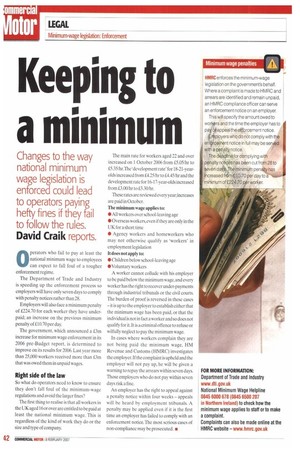Keeping to a rninimu
Page 42

If you've noticed an error in this article please click here to report it so we can fix it.
Changes to the way
national minimum wage legislation is enforced could lead to operators paying hefty fines if they fail to follow the rules.
David Craik reports.
0 perators who fail to pay at least the national minimum wage to employees can expect to fall foul of a tougher enforcement regime.
The Department of Trade and Industry is speeding up the enforcement process so employers will have only seven days to comply with penalty notices rather than 28.
Employers will also face a minimum penalty of £224.70 for each worker they have underpaid; an increase on the previous minimum penalty of £10.70 per day.
The government, which announced a £3m increase for minimum wage enforcement in its 2006 pre-Budget report, is determined to improve on its results for 2006. Last year more than 25,000 workers received more than Om that was owed them in unpaid wages.
Right side of the law So what do operators need to know to ensure they don't fall foul of the minimum-wage regulations and avoid the larger fines?
The first thing to realise is that all workers in the UK aged 16 or over are entitled to be paid at least the national minimum wage. This is regardless of the kind of work they do or the size and type of company. The main rate for workers aged 22 and over increased on 1 October 2006 from £5.05/hr to £.535/hr,The 'development rate' for 18-21-yearolds increased from £4.25/hr to £4.45/hr and the development rate for 16-17-year-olds increased from £3,00/hr to £3.30/hr.
These rates are reviewed every year; increases are paid in October.
The minimum wage applies to: • All workers over school-leaving age • Overseas workers, even if they are only in the UK for a short time • Agency workers and homeworkers who may not otherwise qualify as 'workers' in employment legislation It does not apply to: • Children below school-leaving age • Voluntary workers A worker cannot collude with his employer to be paid below the minimum wage, and every worker has the right to recover under-payments through industrial tribunals or the civil courts. The burden of proof is reversed in these cases —it is up to the employer to establish either that the minimum wage has been paid, or that the individual is not in fact a worker and so does not qualify for it. It is a criminal offence to refuse or wilfully neglect to pay the minimum wage.
In cases where workers complain they are not being paid the minimum wage, HM Revenue and Customs (HMRC) investigates the employer. If the complaint is upheld and the employer will not pay up, he will begiven a warning to repay the arrears within seven days. Those employers who do not pay within seven days risk a fine.
An employer has the right to appeal against a penalty notice within four weeks — appeals will be heard by employment tribunals. A penalty may be applied even if it is the first time an employer has failed to comply with an enforcement notice. The most serious cases of non-compliance may be prosecuted. • HMRC enforces the minimum-wage legislation on the government's behalf. Where a complaint is made to HMRC and arrears are identified and remain unpaid, an HMRC compliance officer can serve an enforcement notice on an employer.
This will specify the amount owed to work:ars and the time the employer has to pay or appeal the enforcement notice.
.Employers who do not comply with the enfprcerrirt notice in full may be served with a penalty notice. The deadline for complying with penalty notices has been cut from 28 to seven days. The minimum pen has increased from £10.70 per day to a minimum of £224.70 per worker.
National Minimum Wage Helpline 0845 6000 678 (0845 6500 207 in Northern Ireland) to check how the minimum wage applies to staff or to make a complaint.
Complaints can also be made online at the HMRC website — www.hmrc.gov.uk


























































































































































































